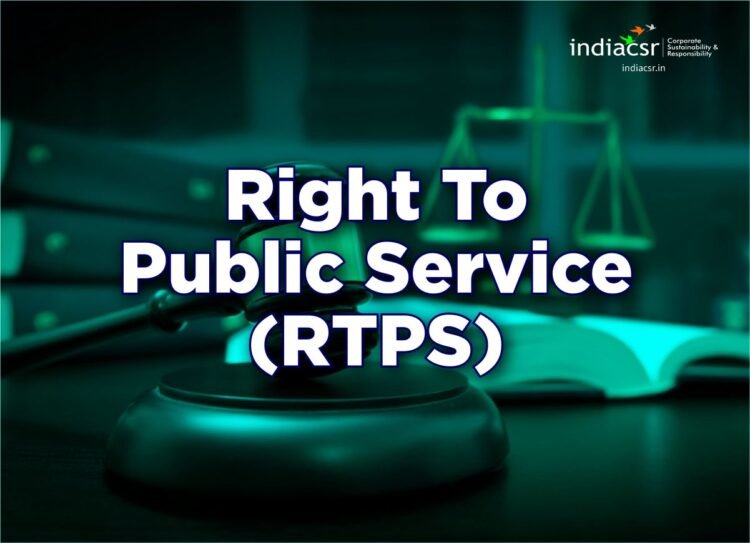Right To Public Service (RTPS) is based on the principle that public services are the right of the citizens and not a favour granted by the government.
Ensuring timely delivery of services under the Right to Public Service empowers citizens and strengthens the democratic fabric of society.
Core Concept of Right To Public Service (RTPS)
The Right to Public Service (RTPS) is an essential socio-legal instrument that guarantees citizens the entitlement to receive specific public services within a defined timeframe. This powerful concept ensures that public services, which form the backbone of administrative machinery, are delivered timely, efficiently, and without any unnecessary delay.
Right To Public Service is a concept that refers to the legal right of citizens to receive timely and efficient delivery of various public services rendered by the government. It also provides a mechanism for holding public servants accountable for any delay or denial of service without reasonable cause.
It empowers the citizens to demand their rightful services and to seek remedies in case of non-delivery or poor delivery of services. It also creates a sense of responsibility and duty among public servants to perform their functions effectively and efficiently.
It also provides a mechanism for holding public servants accountable for any delay or denial of service without reasonable cause.
Definition of Right To Public Service (RTPS)
Definition RTPS is founded on the principle that every citizen has the right to obtain essential public services and that the government is obligated to provide these services in a transparent and accountable manner. It enshrines the citizen’s right to demand quality public services without any discrimination, ensuring an equitable and just society.
The definition of RTPS may vary from state to state, depending on the specific legislation enacted by them.
However, the common elements of RTPS include:
- A list of public services that are covered under the legislation, such as issuing certificates, licenses, permits, etc.
- A designated officer is responsible for providing the service within a stipulated time frame.
- A first appellate authority and a second appellate authority can hear the grievances of the citizens in case of non-delivery or poor delivery of service.
- A provision for imposing a penalty on the defaulting officer and compensating the aggrieved citizen.
The need and purpose of RTPS are:
- To reduce corruption, bribery, and red tape in the delivery of public services.
- To increase transparency, accountability, and responsiveness of the public administration.
- To improve the quality and efficiency of public services and ensure citizen satisfaction.
- To empower the citizens to demand their rightful services and seek remedy in case of violation.
- To promote good governance and socio-economic development of the country.
Why is RTPS needed?
Now, why is RTPS needed? In many societies, public services can sometimes fall short of expectations, be it because of bureaucratic hurdles, lack of transparency, or even corruption. This can lead to delays, frustration, and a loss of faith in the system. Here, RTPS comes into play as a powerful tool to streamline the process, improve accountability, and enhance public trust in government machinery.
What is the purpose of the Right To Public Service (RTPS)
The purpose of the RTPS is manifold. It seeks to make the administration more transparent and accountable, thereby increasing the efficiency of public service delivery. It intends to eliminate the unnecessary bureaucratic red tape that often hampers the delivery of public services. By setting a timeline for service delivery, it ensures that citizens are not left waiting indefinitely for essential services.
Public Service legislation is a step towards ensuring good governance and enhancing citizen satisfaction. It also contributes to the socio-economic development of the country by ensuring that the public services reach the intended beneficiaries in a timely manner.
5 Purpose of the Right To Public Service (RTPS)
The purpose of RTPS in India is manifold and is aimed at making the administration more responsive, effective, and citizen-friendly.
Timely Delivery of Services: One of the primary purposes of the RTPS in India is to ensure the timely delivery of public services to the citizens. By stipulating a definitive time frame for various services, RTPS makes sure that citizens do not have to face indefinite delays.
Transparency and Accountability: RTPS Act increases transparency and accountability in the public service delivery process. It obligates government officials to provide the requisite services within the specified time, failing which they could face penalties.
Reduction in Corruption: By setting clear service standards and timelines, RTPS aims to reduce corruption and bureaucratic red tape. When service delivery becomes more streamlined and transparent, the chances of bribery and corruption diminish.
Empowering Citizens: RTPS empowers citizens by providing them with a legal mechanism to demand their rightful public services. It gives citizens the power to hold the government accountable, thereby strengthening the democratic ethos of the nation.
Enhanced Public Satisfaction: By ensuring the timely delivery of services and improving the overall efficiency of government machinery, RTPS enhances public satisfaction and restores trust in government institutions.
Right To Public Service Legislation in India
Right To Public Service legislation in India comprises statutory laws enacted by various states to guarantee time-bound delivery of services for various public services such as issuing certificates, licenses, permits, etc. and to provide a grievance redressal system for the citizens. The aim of this legislation is to reduce corruption, increase transparency and public accountability, and improve the quality of governance.
Right To Public Service Legislation in India comprises statutory laws which guarantee time-bound delivery of various public services rendered by the Government to citizen and provides a mechanism for punishing the errant public servant who is deficient in providing the service stipulated under the statute. Right to Service legislation is meant to reduce corruption among government officials and to increase transparency and public accountability.
Madhya Pradesh became the first state in India to enact the Right to Service Act on 18 August 2010 and Bihar was the second to enact this bill on 25 July 20111. Several other states like Bihar, Delhi, Punjab, Rajasthan, Himachal Pradesh, Kerala, Uttarakhand, Haryana, Uttar Pradesh, Odisha, Jharkhand Maharashtra and West Bengal have introduced similar legislation for effectuating the right to service to the citizen.
The common framework of the legislations in various states includes granting of “right to public services”, which are to be provided to the public by the designated official within the stipulated time frame. The public services which are to be granted as a right under the legislation are generally notified separately through Gazette notification.
Some of the common public services which are to be provided within the fixed time frame as a right under the Acts include issuing caste, birth, marriage and domicile certificates, electric connections, voter’s card, ration cards, copies of land records, etc.
On failure to provide the service by the designated officer within the given time or rejection to provide the service, the aggrieved person can approach the First Appellate Authority. The First Appellate Authority, after making a hearing, can accept or reject the appeal by making a written order stating the reasons for the order and intimate the same to the applicant and can order the public servant to provide the service to the applicant.
An appeal can be made from the order of the First Appellate Authority to the Second Appellate Authority, who can either accept or reject the application, by making a written order stating the reasons for the order and intimate the same to the applicant and can order the public servant to provide the service to the applicant or can impose penalty on the designated officer for deficiency of service without any reasonable cause, which can range from Rs. 500 to Rs. 5000 or may recommend disciplinary proceedings.
The applicant may be compensated out of the penalty imposed on the officer. The appellate authorities have been granted certain powers of a Civil Court while trying a suit under Code of Civil Procedure, 1908.






















